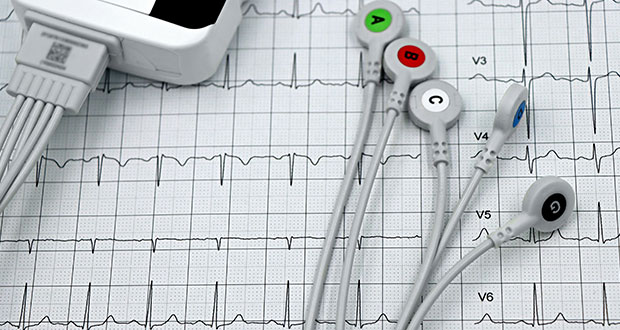An electrocardiogram (also referred to as an ECG or EKG) is a test that analyzes the electrical activity of your heart. The test, which takes approximately ten minutes to perform, involves a technician attaching twelve leads to your chest and then getting a 12-line printout that reflects your heart’s activity during a 10-second window.
So, what exactly can an EKG tell you about your heart’s health?
1. An EKG can reveal an arrhythmia (an abnormal heart rhythm).
A healthy heart should be pumping in a steady rhythm. However, when there is dysfunction in the electric signals sent from one part of your heart to another, the heart beats abnormally, which produces an arrhythmia. Since an EKG is measuring the electrical activity of your heart, it quickly picks up these arrhythmias.
2. An EKG can reveal if your heart is getting enough oxygen.
Your heart is a hard-working muscle that requires plenty of oxygen in order to stay strong and function properly. However, due to blockages or constrictions in the coronary blood vessels, the heart can experience ischemia, a dangerous state in which the cardiac tissue is under perfused. If your heart experiences prolonged ischemia, the muscle can actually start to die, leading to heart failure and even death. An EKG is a useful tool that helps medical providers evaluate how much oxygen your heart is getting and intervene immediately if your heart is ischemic to prevent catastrophic complications.
3. An EKG can reveal if your heart is enlarged.
A healthy heart is about the size of your fist, located just left of center in your chest. However, there are some medical conditions that can cause cardiomegaly (an abnormally enlarged heart.) Causes include untreated high blood pressure, viral infections of the cardiac muscle, advanced age, and heart failure. Often cardiomegaly shows up on an EKG as abnormally large waveforms, which can alert your medical provider to a serious underlying condition
4. An EKG can tell you if you’ve had a heart attack in the past.
While heart attacks often cause significant symptoms that prompt patients to seek immediate medical attention, in 45% of cases, symptoms are so mild that patients don’t realize there’s anything wrong with their heart. These are referred to as “silent” heart attacks, which often show up weeks or months later as characteristic abnormalities on an EKG that alert your medical provider that you have a potentially dangerous blockage in your coronary arteries that has led to ischemia in the past and will likely lead to an even worse event in the future if left untreated.
But.. is an EKG really enough to detect all other heart diseases? The short answer is NO!
ECG or EKG is effective but only on diseases of an electrical nature or interfering with its electrical pathway, seriously limiting ECG’s effectiveness to detecting and diagnosing only about 44% of all common heart diseases by prevalence in Primary Care. This includes ALVD and EF, which is what a new AI-Powered heart diagnostic device by Cardio Phoenix Inc. was trained on and for.
Cardio-HART can diagnose not only ALVD and determine the EF, but also 13 other heart disease conditions normally diagnosed by Echocardiography. Additionally, it includes all the typical ECG diseases, including some 39 ECG findings and 185 ECG parameters, plus 40 heart sound findings, and 29 physiological findings.
Cardio-HART is so powerful it is able to detect and diagnose up to 94% of all common heart diseases prevalent in Primary Care.
You can read – Medical device that will revolutionize cardiac care.
At 94% efficiency, this opens the door to an effective widespread screening of asymptomatic patients. A BREAKTHROUGH device that includes some of the most advanced AI to help understand the innovative new bio-signals which when combined to ECG/EKG are able to detect and diagnose up to 94% of all common heart disease by prevalence in primary care.








